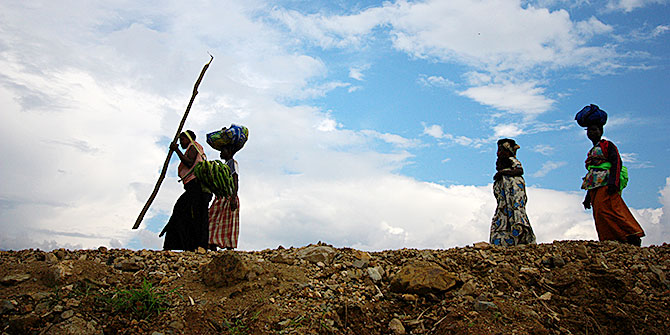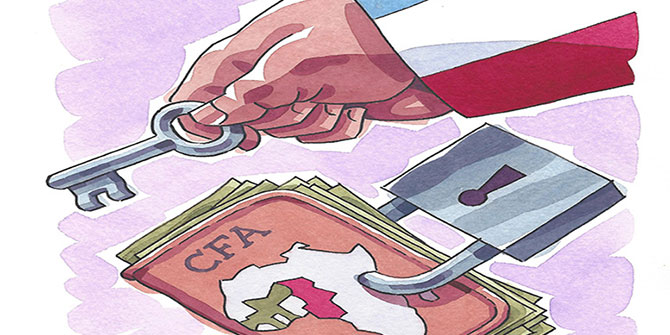Development scholars advocate community mobilisation for effective home-grown solutions to local problems. In this post, Jeffrey Paller explores mitigating factors that determine how community leaders wield power togenerate collective action.
This is the first in a joint series with the Favelas at LSE blog entitled Social Development Challenges for Africa.
Ebola is not the only public health crisis confronting West Africa. In Ghana, more than 20,955 cases of cholera have been reported as of early October, resulting in 166 deaths. The outbreak is so bad that the Centers for Disease Control issued a travel warning. The Accra Metropolitan Assembly (AMA) traces the outbreak to food cooked in unsanitary conditions. Not surprisingly, Ghana’s urban slums are particularly at risk.
The cholera outbreak is part of a larger and systemic problem of lack of sanitation in Ghana’s capital city. Sewers are uncovered and choked; garbage is tossed in ravines and waterways, and sanitary facilities are under-provisioned. Yet while AMA authorities blame migrants and squatters and the World Health Organisation has offered technical support for medical assistance, my research has found that more attention needs to be paid to local political dynamics in slums—particularly community leadership.
It is helpful to think about sanitation—like cleaning sewers—as a collective action problem. All members of the community benefit from clean sewers. But cleaning the sewers has a cost, and it is unlikely for any one person to attempt to clean the sewers by him or herself. Further, ordinary residents will attempt to “free ride,” or benefit from the clean sewers without participating in the clean-up. The optimal outcome, then, is to share the cost of cleaning the sewers among all residents in the slum.
Yet what is common in many Ghanaian slums is the under-production of the public good: nobody pitches in to clean the sewers, and they look like this:

But not all sewers across the city are dirty and filled with trash. In April 2013, I collected data on 150 slum neighborhoods in Accra, Ashaiman, and Kumasi and found that there is significant variation in the cleanliness of sewers. Some neighborhoods had no sewers at all, some were filthy, some had a little garbage thrown in, and some were mostly clean. The map below shows this variation across ten slum communities in Accra (three slums in both Kumasi and Ashaiman are not shown):

This leads to an important question: Why are some slum communities able to come together to clean their sewers and serve the public interest while others are not?
I find that the answer lies in community leadership. In contexts of weak state institutions, high levles of poverty, and ethnic diversity, community leaders play a particularly important role in keeping their neighbourhoods clean. Leaders are expected to mobilise the youth for communal labuor exercises like cleaning sewers; demand municipal authorities to pick up garbage; and fundraise for local development projects. In many respects, this is the responsibility of the local assemblyman (see Chapter 8 of linked brochure). As one resident told me: “A good assemblyman is one who stays in the community and makes sure the community is clean, one that is able to mobilise the youth for communal labor” (Old Fadama, 6/4/12).
In my recent article in African Studies Review (December 2014), I argue that leaders are constrained and enabled by informal institutions of leadership that shape how they gain power in daily life. These rules are created and enforced outside of officially sanctioned channels. But what is most surprising in my research is how these informal institutions vary across different slum communities.
In Ghana, I find that there are three types of settlement patterns that become informally institutionalised over time. In other words, there are three informal institutions of settlement, defined as the norms, duties, and obligations attached to the question “who settled first, and how.” In illegal settlements, early settlers came and illegally occupied the land; in purchased settlements, early settlers legitimately purchased the land from a customary authority; in indigenous settlements, populations make indigenous claims to the city. Unsurprisingly, claims to these urban spaces are contentious and do not always neatly fit into these ideal types.
What I find is that these different settlement patterns shape the underpinnings of accountable leadership. These institutions shape how leaders interact with their followers: whether they serve private, club, or the public interest.
In illegal settlements like Old Fadama (locally called Sodom and Gomorrah), Abuja, and King Shona, residents constantly worry about evictions and leaders and politicians exploit this insecurity, undermining the public good. In purchased settlements like Nima, Maamobi, and Sabon Zongo, residents engage in local politics by attending public forums and making demands for more public goods because they have legal status. In indigenous settlements like Ga Mashie, Chorkor, and Shiabu, residents and leaders take pride in their indigenous status and seek to keep outsiders from taking over their city—they develop strong ethnic pride. Yet cross-ethnic coalitions are difficult to sustain.
Of course, these are oversimplifications, but I suggest that these varying settlement patterns serve as the basis of politics and community leadership because the meanings and narratives attached to these settlement patterns are so pervasive in daily life. In turn, these informal institutions of settlement help explain why purchased settlements tend to have leaders that can mobilise the youth to clean sewers, while many illegal settlements struggle with poor leadership. It can also help explain why many indigenous communities are being “downgraded” to slum status.
While there is no conclusive data, it appears that the communities hit hardest by the cholera outbreak are illegal and indigenous settlements. Rather than placing blame and stigmatising these communities, it would be more productive to understand the roots of the problem so that they can be fixed.
Development challenges, like overcoming cholera, are local issues that involve overcoming collective action problems in Ghanaian communities. This is also the case in Kenya where institutions and cultural norms help maintain public goods; it is the case in countries across the world where non-state providers of social welfare are responsible for the well-being of populations; and it is the case in many more contexts where state and formal institutions are weak and people live in poverty.
While development and public health often appear daunting, there might be a simple place to start: cleaning sewers.
Jeffrey Paller is a visiting lecturer of politics at Bates College where he offers courses on cities, slums and democracy; African politics and development; and democratization in the world. His work has been published in Polity and African Studies Review.
The views expressed in this post are those of the author and in no way reflect those of the Africa at LSE blog or the London School of Economics and Political Science.





